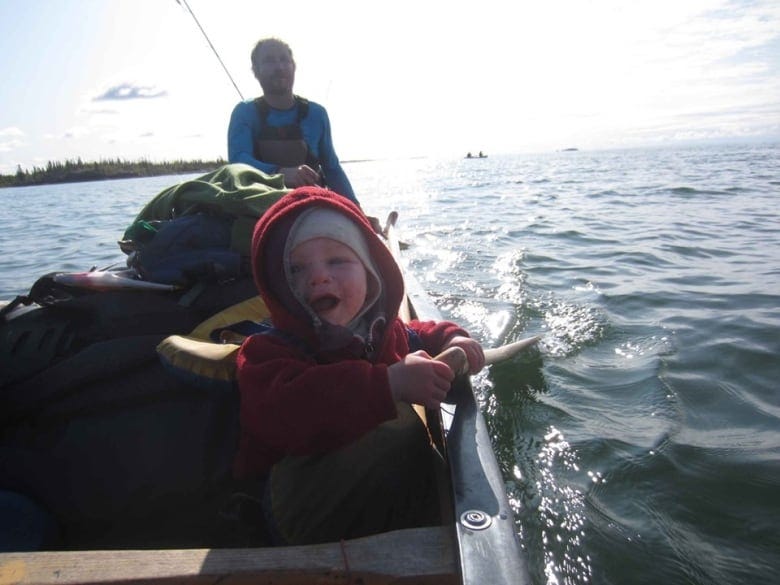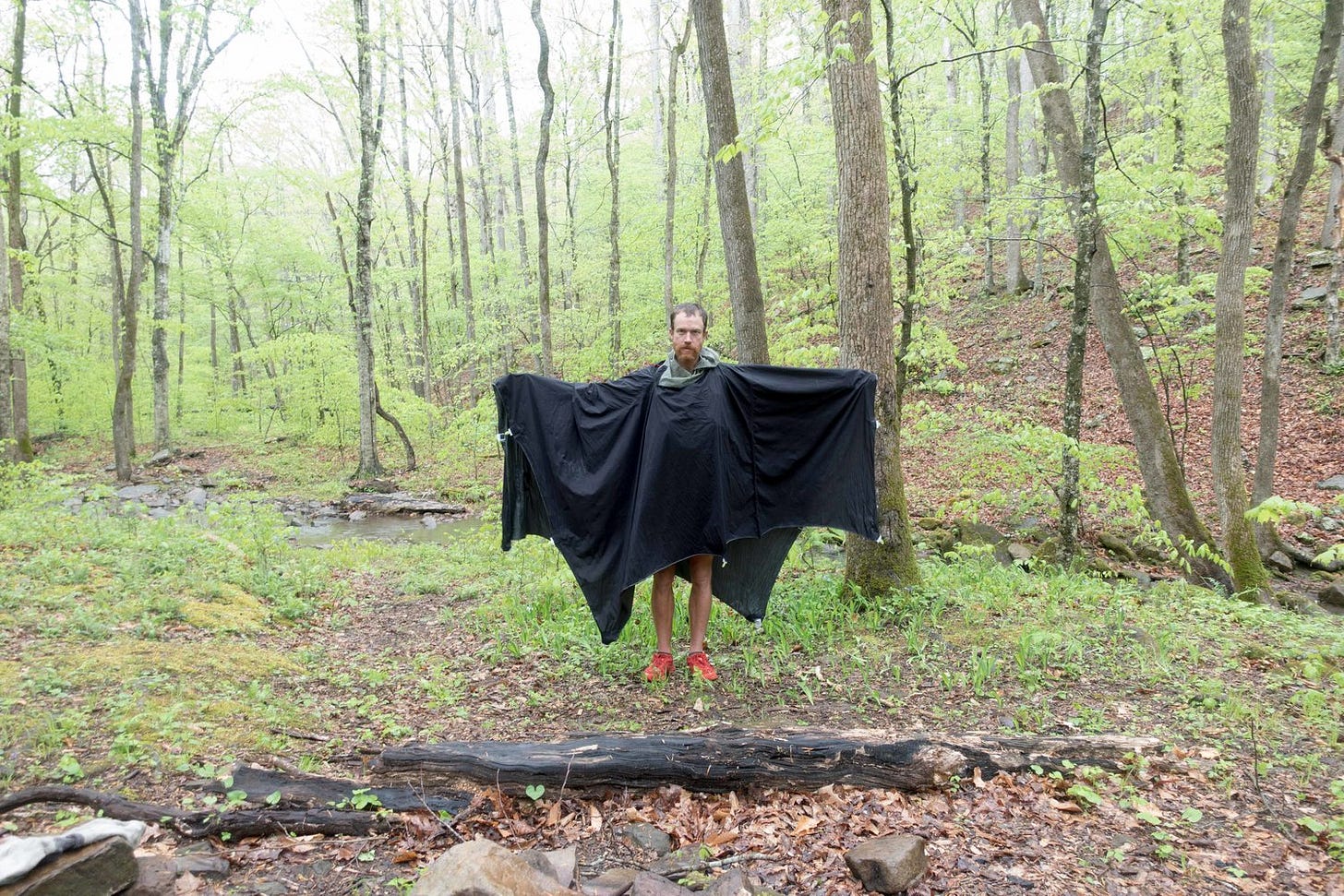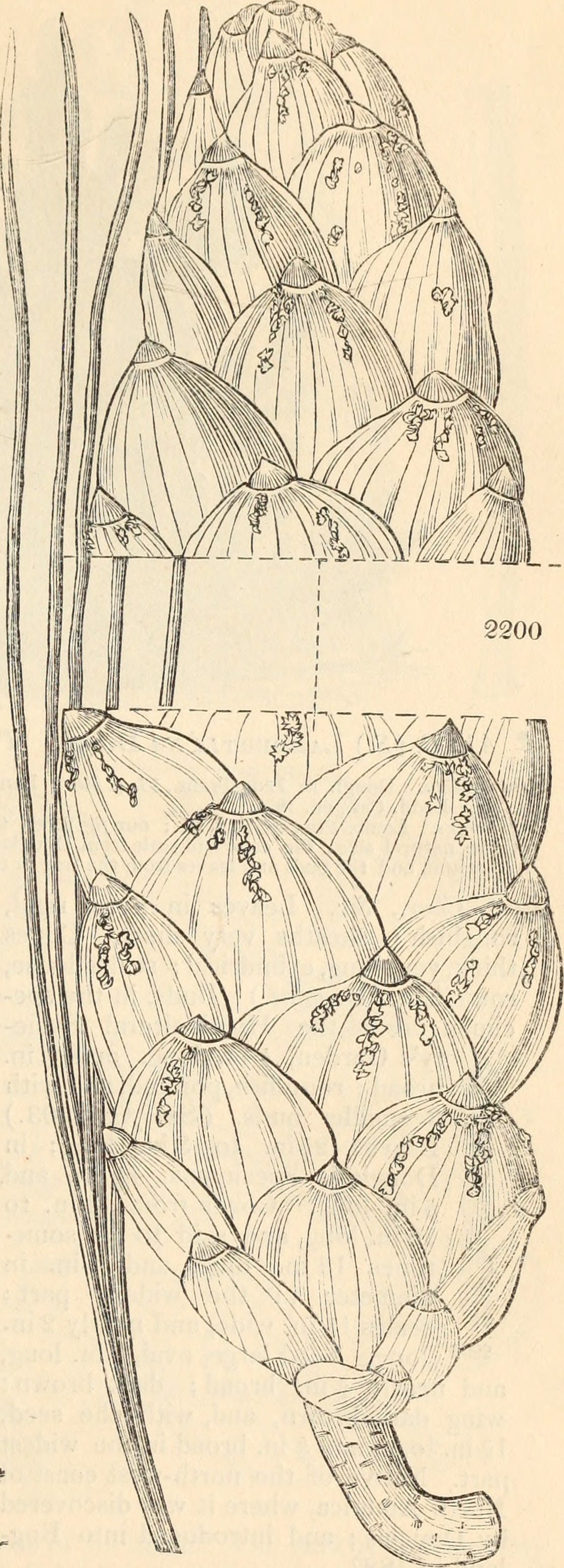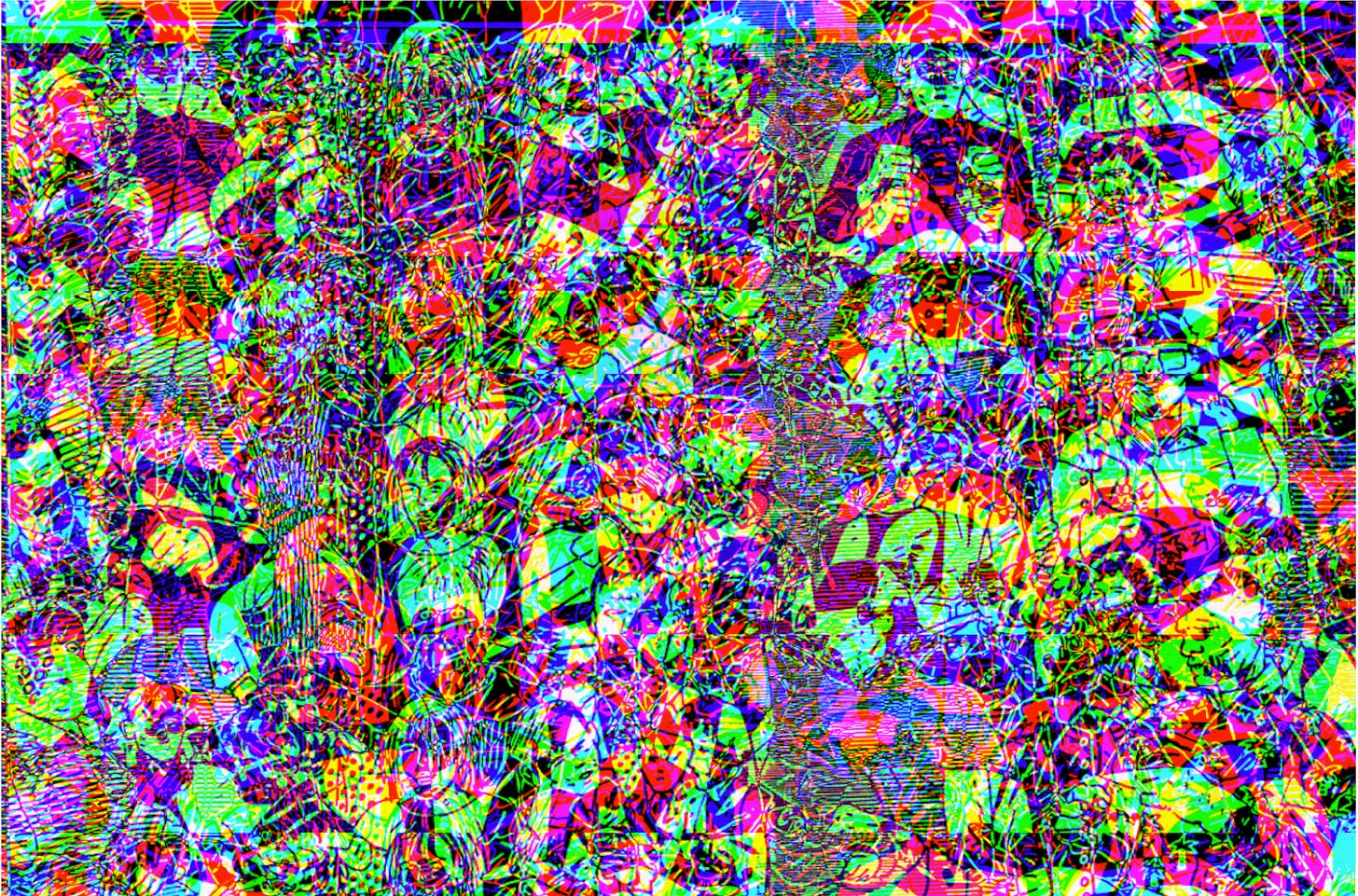Two trips
I want to tell you about two trips. In the first trip, a woman crouches over a toddler somewhere out in the tundra. He needs to pee. She strips layer after layer of clothing from him in a cloud of merciless black flies and mosquitoes. She does this because he is also potty training. In a scenario where I would be weeping with frustration, she is superhuman in her patience and stoicism. The boy wails above the drone of biting insects. In the second trip, a man hides in the shadow of an outflow pipe in the Sonora desert. He has been pushing his only dwindling supply of water on a hacked together stroller for days. His face is cracked. He’s emaciated. He still has a weeks of running left before the end of his journey. The question for both trips is: Why?
The first expedition is that of a couple legendary local canoeists here in Yellowknife, Leanne Robinson and Dwayne Wohlgemuth, who spend the summer months traversing the waterways of the tundra and boreal forest in a canoe. Their latest journey was captured in the film Family Routes. They paddled 1500 kilometres through remote forests with their two young boys, their dog, and a film crew. Why go?
One of the set pieces of the film features Leanne sitting on a rock in her rain shell, trying to explain why they’re out there. It’s clear she’s been struggling with the question. She brings up a book, Being Caribou, about another couple's sub-arctic journey following the Porcupine Caribou Herd on foot. Leanne remarks how the other couple’s reasons for being out there were so visceral, direct, and obvious. Leanne and Dwayne’s trip didn't have anything like that. She talks about this phenomenon of being able to see why the trip was valuable in fleeting moments, like in the beauty of a landscape when cresting a certain hill. At moments like those, she knows that the trip is valuable in a deep way, but she can't articulate specifically why. She remarks that it's a hell of a long way to travel just to walk up that particular hill and experience that moment. Eventually she acknowledges that there are thousands of reasons why the trip was worthwhile, but the fact that it makes her and her family happy is enough of a reason for her.

The second journey features Rickey Gates running across the continental United States alone. Tell me, Rickey, why do hard things? His stated intention was to learn something about himself and maybe something about America in the process. Gates did seem to learn something about America. Every town seemed full of decent folks who would warn him about sketchy people in the next town over. Then he would get to the next town, and they would say the same thing about the next town after that. He also learns more about himself, but only the version of himself that's running across the US. There's no core, universal self that he gains knowledge of. A journey is a kind of microclimate of the Self in Time, where things that hold true inside it won't necessarily mean anything outside of it. So Gates arrives knowing more deeply what he knew all along.
While these answers to the question Why? seem to serve Rickey, Dwayne, Leanne, Aleksi, and Emile, they don’t get at the reasons for expeditions in general. They don’t answer the big Why? behind the physical, seemingly meaningless journeys people undertake.

Futile, beautiful things
There's a poem called “The Door” by Tom Wayman that we can use to enter the Why? He describes a door in the woods. There's no reason to walk through it. It's easy to avoid, walk past, and you know that "To unbolt the door and step through / almost certainly would not lead / to a new destination, nor would I be transformed / by insight: my behaviour would not differ,/ I would approach no marvels.” According to Wayman, we know on some level that there is no rational basis for paddling 1500km of boreal water or running across the US. “Yet a door stands / in a wood." You must step through it. In the words of Scott Jurek, another storied ultra runner, "Sometimes you just do things." There’s a similar joke in the mountaineering community that goes like this:
Q: Why climb the mountain?
A: Because it’s there.
Human curiosity, our hunger for arrivals, just works that way. At some point, it doesn't matter what the underlying causes of the journey are because people will do them anyways. We kind of can't help ourselves.
That futility is beautiful, and I mean capital-B Beauty in the sense that Timothy Morton describes in his book Being Ecological: “You can’t quite grasp it […] beauty must be fringed with some kind of slight disgust, something that normative aesthetic theories try to wipe off […] A shifting world, a world of love, of philos.” This frames expeditions and their resistance to satisfying, rational framing as a kind of performance art, which, in a way, they are. But the people who do them certainly don’t think of themselves that way, at least not that I’ve seen.
A short history of experiential gestalts
So why do it? For Gates, he seems to be doing it for the same reason that I go on trips (not that any trip I've done has even come close to trans-American scale). The journeyer wants a crucible to enter, an intense experience that will reliably produce a better, wiser, more fully integrated person. This is a psychological operating system for wanderlust. In other words, Gates is trying to construct a rite of passage.
The global monoculture of late capitalism has stripped away many rites of passage. A grossly simplified historical narrative of how this came to be might read something like this: Abrahamic religions are primarily about "believing." They’re about conceptual, inner landscapes, interiority, very “heady” stuff, especially since Descartes’s enlightening cogito ergo sum. Ancient Roman religion was actually much more about just doing the rituals prescribed. It wasn’t a matter of, "I believe in Jupiter, therefore I do this ritual." It was just, "I do this ritual." “Sometimes you just do things.” I do, therefore I am. Early Christian orthodoxy in the latter centuries of the Roman Empire aggressively suppressed this pathway into being, along with art, architecture, and anything else "pagan."
Christianity had its own set of more cerebral rituals to replace whatever came before, but somewhere around the beginning of “modernity” we replaced the Christian rituals with “buy more shit.” That never really works either, does it? Getting your drivers’ license or buying a prom dress doesn’t give your life meaning. We're left with a hunger to mark the crossings of thresholds into maturity and our roles in our communities. Or, if we are older, we need reliable tools to re-evaluate ourselves as people and renegotiate those roles. So many people, myself included, try to reconstruct those tools out on the highways, in the forests, and on rivers.
I have a three-part theory of how ritualistic journeys act on our psychology. The first part is that the insistence of physical presence on a canoe trip frees our minds. Our working memory is governed by something called the “Zegairnik Effect,” named for a Russian researcher who wondered how waiters remember the orders of each table perfectly without writing anything down. The trick, it turns out, is the ability to empty the last table’s order from your mind completely before you try to remember the next one. Our cognitive functioning requires that we empty our working memory sometimes. This is why to-do lists work. One of the common experiences of long term, human powered travel in the outdoors is that you only have to focus on one thing at a time: getting to the end of that portage, to the end of the next lake, one paddle stroke at a time, one day at a time, one moment at a time until there’s no moment and you just are. This is so radically different from the cacophony of torturous routines, to-dos, and productivity habits a modern knowledge worker needs to just sit down at their desk to start working. Working from home makes it worse. Eventually one reaches the point where the stress and risk of running a canoe over a waterfall on a remote, frigid river is preferable to another video conference call. Perhaps the fact that our short term memory feels relatively empty on a journey makes the experience of journeying more pleasurable. Pleasure is a reason to do something, an answer to the Why?
The ritual of a journey also builds self esteem. Showing yourself, day in and day out, that you can do hard things is a magnificent reminder of your quality as a person. Every step or paddle stroke is a little self-esteem boost in a world where the mechanisms of consumerist culture so often tell us that we are not enough.
Lastly, we construct meaning from patterns in our environments. Rituals are what Lakoff and Johnson call “experiential gestalts.” A “Gestalt” is just a German word for “form” or “shape” that psychology people like to use. So we construct meaning from recognizable patterns in our experiences. When we recognize a series of occurrences in our sensorium as a whole more essential than its parts, we have a gestalt. A journey, any journey, is one such pattern. Experiential gestalts create new conceptual metaphors, new coherences, and new pathways to meaning in our lives.
Ecological bodies
Enough about psychology. What about bodies? After all, paddling and running are intense endurance sports, even if they’re also more than that. Part of the not knowing in the mountaineer’s “Because it's there" punchline gestures at the fact that things like paddling and running are deeply embodied, physical activities. Journeys usually involve moving a body through space and time. As more and more of us spend more and more time doing sedentary “knowledge work”, the body’s modes of knowing seem to atrophy. Journeys flip the switch into that embodied mode of being.
I’ve felt it in a fleeting way right after long days of paddling, a weekend long run, or an intense yoga session—that feeling of what I like to call "good tired." It feels like your body and mind have been wrung out like a sponge and you're left with a buzzing, beautiful, resonant emptiness. You can't think your way to that point, and it never lasts long. Eventually I reach an impasse, a dearth of meaning where I can no longer rationalize my way through. The only way is to move through it, to move my physical body until I’m good tired.
Moving a body through a space is also a beautiful way of attributing worthiness to that space. It's a kind of worship, like shouting, "Look!" and pointing to the environment millions of times with millions of steps and dips of a paddle. Consciously moving through a space is a signal that the space has value, otherwise why would you be there? This, I suspect, might lie behind the success of another running project Gates is famous for: running "every single street" of San Francisco. Every Single Street has spawned a whole genre of copycats paying tribute to their hometowns as every formal endurance event has been cancelled. This moving worship becomes transgressive because the spaces of an expedition are often not normative spaces for human appreciation. Journeys can enter an ecological mode of being where cities and deserts and dusty industrial estates and mosquito infested muskeg all connect to a moving human body. It’s a way to “be ecological” and become a small part of the environment. Journeyers point to their surroundings with every focussed fibre of themselves and exclaim, “Look what we’re a part of. How magnificent and terrible and beautiful!”
Screens can’t do this. There's something about technological modes of being that tend to bypass ecological effortfulness. You can't worship mountains on a treadmill. Technological pathways into awe often leave us hollowed out, twitchy, and numb. Embodied ritual gives us one way out.
Life spirit intensification
In a way, journeys are also a beautiful way of marrying the striving and unfolding routes to becoming a more integrated person. Striving is the dominant “self-improvement” mode you see in every #fitspo #goals post. Venkatesh Rao calls it the “personal growth frame.” From time’s perspective, the personal growth frame always pushes importance away from the constantly unfolding now and into the past, where you conceived your plan, and the future, where (you hope) your plan will be actualized. Training for a trip is a perfect model of striving. You buy into a process based method of incremental improvement towards a goal.
On the other hand, the unfolding route to actualization requires more trust that, in the words of John Lennon, you can “float up stream” to arrive where you need to be. Rao calls this “life spirit intensification:” you go in as harsh grain alcohol and you come out as mellow single malt. He suggest that, rather than focusing on growing in a fixed, pre-determined trajectory towards a life you don't have, focus instead on "intensifying" yourself as you embrace how your life is actually turning out. This is not stasis or passivity, but a growing aliveness to the ways in which you are responding to actual challenges in your life. A person on a big expedition both strives and intensifies. You do all that striving in training so that you can be put in the context to intensify over the course of a journey.
And you need intensity to do it. Comfort intensifies nothing. In another poem from the same collection, Wayman describes the conflicted nexus of comfort, intensity, and becoming in terms of trees and a game. He describes normative life in late capitalism as a jigsaw where you spend your time "working hard to re-create a picture on the box I purchased." The fact that it’s a box you must purchase places it in the consumerist norm. It's also a jigsaw puzzle, which implies that it's a kind of game. It isn’t visceral, but rather something constructed to challenge you in a superficial way, just enough so that you stay “leaning over a table […] in the glow of a fluorescent.”
He juxtaposes this with the pines “churning the dark in wild and pitiless gestures” outside his house. "Pines thrive in arid soil [...] only reproduce in the heart of the blaze, / their cones needing the insatiable rage of flames / to climax, open, release."
The final line of the poem implies that even if you "finish the puzzle" you'll still find pieces missing. "The one piece that remains to be found is a pine."

Further reading
This essay begins where bluelight vol. 2 ends, with effort as a pathway to meaning. If you haven't read Sourdough is the Vinyl of Carbs, have a look.
Go find Family Routes on a streaming service.
Transamericana is available for free on Youtube.
Metaphors We Live By, by George Lakoff and Mark Johnson, is all about how conceptual metaphor and experiential gestalts help us understand ourselves and the world.
I encountered the Zegairnik Effect in Söhnke Ahrens’s book How to Take Smart Notes. It’s a good primer for Zettelkasten-style note taking and writing.
I've read a couple books about ancient Rome lately: The Darkening Age by Catherine Nixey, which is about the early Christian genocide of classical peoples and cultures, and SPQR where Mary Beard gives a revisionist history of the first millennium of Ancient Rome, including a really interesting line of argument for Rome as an ancestor of modern pluralism
Both of the poems come from Tom Wayman’s Watching a Man Break a Dog's Back: Poems for a Dark Time.
I reference Venkatesh Rao’s writing in pretty much every one of these newsletters. This month it’s Life Spirit Distillation.
The definition of beauty and the idea of an ecological framework of being come from the appropriately titled Being Ecological by Timothy Morton. I’m two chapters in, and it’s already re-framing the way I think about environmentalism.
If you like your ultra endurance stories with a side of vegan propaganda, Scott Jurek’s Book Eat & Run is a good place to start. It’s where I encountered his mantra, “Sometimes you just do things,” for the first time.
Music
Here's every noteworthy song I’ve (re)discovered in February so far.
Art
I want to publish some new art in every issue of the newsletter. This month's image is a detail from a larger piece that I made using modified, open source Processing scripts, Sketch, and fragments of Heavy Metal Magazine back issues.
Share bluelight
If you know anyone who would enjoy the newsletter, please let them know about it. I’m grateful for every single reader here.
Thanks for reading and for your support.



Great read Justin so proud to call you BIL . We all have our own WHYs and that’s exactly what they are ..our own. Can’t wait to check out the families canoe journey sounds fascinating and brave.